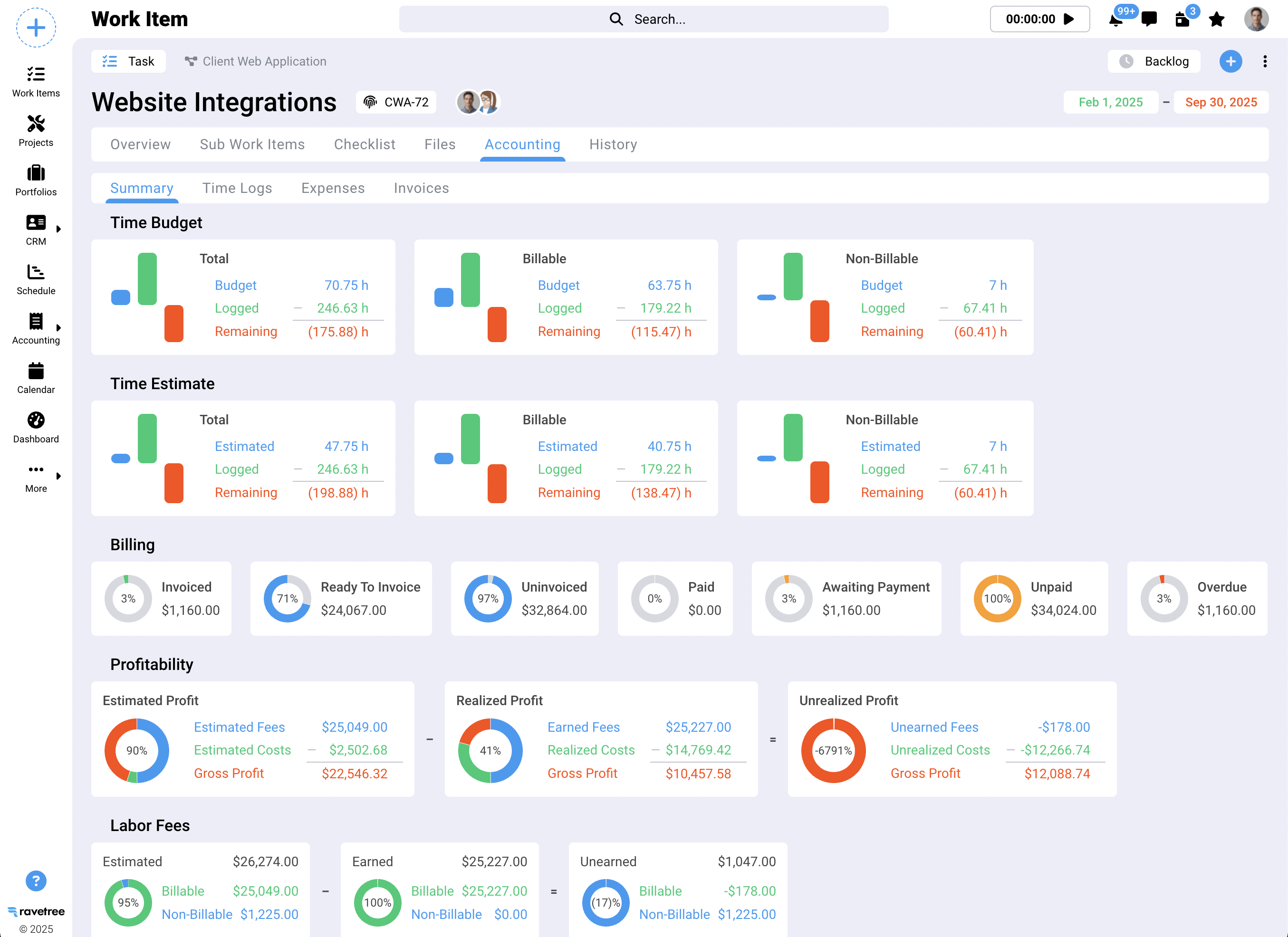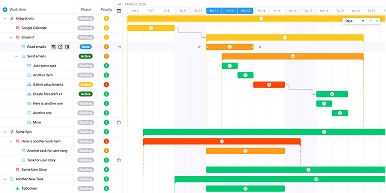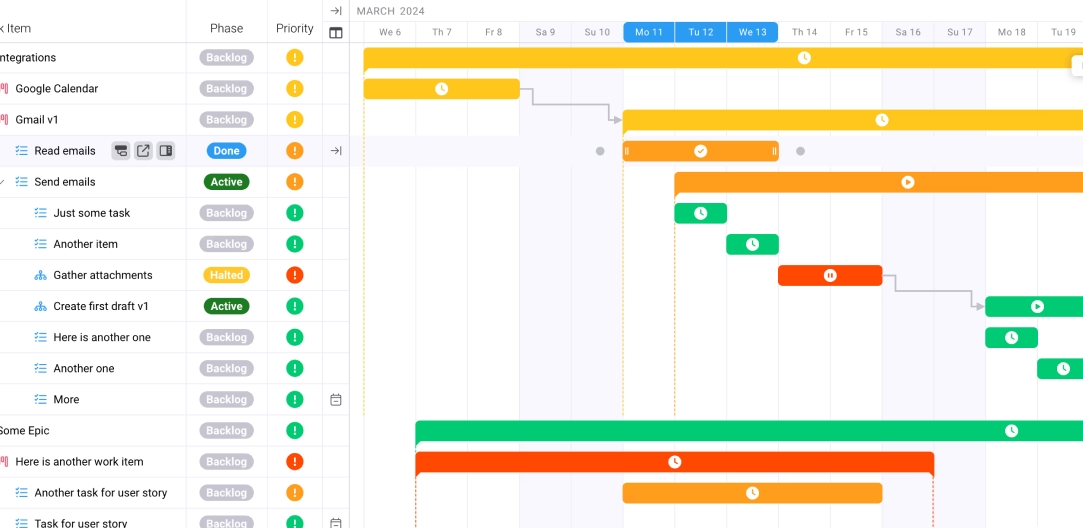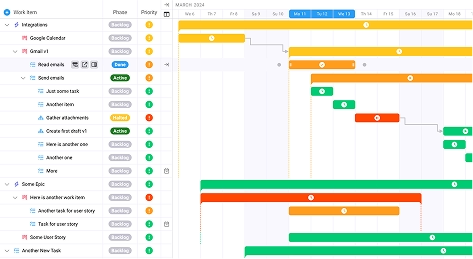
Ravetree vs. Teamwork: Which Is The Best Tool For Agencies?
Key takeaways:
Choosing between Ravetree and Teamwork for your agency isn't just about comparing feature lists—it's about finding the platform that aligns with how your team actually works. Both tools position themselves as comprehensive solutions for agencies managing client projects, but they take distinctly different approaches to solving the same fundamental problems that plague professional services firms: fragmented workflows, budget overruns, and the constant juggle between profitability and client satisfaction.
This comparison examines Ravetree vs. Teamwork through the lens of what agencies actually need: robust project management, seamless resource planning, accurate time tracking, and financial visibility that keeps projects profitable. We'll cut through the marketing speak to give you an honest assessment of where each platform excels and where it falls short.
Understanding the Landscape: What Agencies Really Need
Before diving into the Ravetree vs. Teamwork comparison, it's essential to understand what makes agency project management uniquely challenging. Unlike internal teams working on single initiatives, agencies manage multiple concurrent client projects, each with different scopes, budgets, timelines, and stakeholder expectations.
The complexity of agency work demands tools that go beyond basic task management. You need platforms that integrate project delivery with resource forecasting, time tracking, cost control, and profitability reporting—all while keeping clients informed and engaged throughout the process.
Both Ravetree and Teamwork were built with these challenges in mind, but their solutions reflect different philosophies about how agencies should operate.
Ravetree: The All-In-One Approach
Ravetree positions itself as a comprehensive work management platform specifically designed for project-driven organizations. The platform emphasizes being a "single source of truth" that eliminates the need to juggle multiple disconnected tools.
Core Strengths of Ravetree
Integrated Financial Management
One area where Ravetree distinguishes itself is in financial project tracking. The platform includes robust budgeting capabilities that let you forecast project costs based on anticipated resource needs, then track actual spend against estimates in real-time. You can see profitability metrics at both the task and project level, which is crucial for agencies that need to maintain healthy margins.
The billing and invoicing functionality is built directly into the platform rather than bolted on as an afterthought. You can create client-specific rate cards, manage retainer agreements, and generate invoices from approved time logs and expenses—all without leaving Ravetree or integrating with separate accounting software (though QuickBooks integration is available if needed).
Resource Planning and Utilization
Ravetree's resource planning tools provide visibility into team capacity and utilization. You can see who's over or under-allocated, visualize utilization by day, week, or month, and identify skills gaps before they become bottlenecks. This is particularly valuable for agency leaders who need to balance workloads and make informed hiring decisions.
Client Portal and Collaboration
The platform includes client portals that give external stakeholders visibility into project progress without overwhelming them with internal workflows. Clients can submit requests, review files, approve deliverables, and track milestones—keeping them engaged while maintaining appropriate boundaries around your team's work.
Agile and Traditional Methodologies
Unlike many agency tools that force you into one project management methodology, Ravetree supports both traditional waterfall approaches (with Gantt charts and dependencies) and agile methodologies (with Kanban boards, sprints, and backlogs). This flexibility is valuable for agencies working across different project types and client preferences.
Pricing Structure
Ravetree starts at $39 per user per month, positioning it at the higher end of the market. However, this includes the full suite of features including CRM, resource management, and financial tracking without tiered feature restrictions. The company offers free training, setup, and customer support, which can offset the higher per-seat cost for teams that need hands-on assistance getting started.

Teamwork: Client Work Optimization
Teamwork has built its reputation around being well-suited for client-facing work. The platform emphasizes collaboration, transparency, and the specific workflows that characterize agency-client relationships.
Core Strengths of Teamwork
User-Friendly Interface
New team members can get up to speed quickly, and the visual design makes complex projects feel manageable. The platform includes helpful onboarding videos and contextual help that reduces the time to productivity.
Flexible Collaboration
Teamwork excels at facilitating collaboration both internally and with external stakeholders. The platform allows unlimited collaborators and clients on many plans, making it cost-effective for agencies that work with numerous external partners. Free guest access means clients can participate without inflating your licensing costs.
Time Tracking and Billing
Like Ravetree, Teamwork includes time tracking with the ability to mark tasks as billable or non-billable, set time budgets, and generate invoices. The time tracking feels well-integrated into the task management workflow.
Project Templates and Efficiency
Teamwork's template system is useful, allowing you to save project structures, task lists, and workflows that can be replicated for similar client engagements. This saves setup time for agencies running repeatable service offerings.
Workload Management
The platform provides workload visualization that helps you understand team capacity and identify resource conflicts before they derail projects. This is crucial for agencies trying to optimize billable utilization while preventing burnout.
Teamwork's Limitations
Reporting Consistency
Some users report frustrations with report generation, noting inconsistencies in what works from one session to the next. For agencies that rely heavily on standardized client reporting or need to pull financial data for management meetings, these issues can be problematic.
Advanced Customization
While Teamwork is highly usable out of the box, agencies needing deep workflow customization may find the platform more constrained than alternatives. The balance between simplicity and flexibility means some advanced use cases hit limitations.
Cost for Growing Teams
Teamwork's pricing starts lower but can escalate as you add features and users. The Deliver plan ($10.99 per user/month when billed annually) provides core functionality, but you'll need to move to the Grow plan ($19.99 per user/month) or Scale plan ($54.99 per user/month) to access advanced features like custom fields, workload management, and enhanced reporting.
Pricing Structure
Teamwork offers a free plan for up to 5 users with 2 projects, making it accessible for very small teams or those wanting to trial the platform extensively. Paid plans start at $10.99 per user per month (billed annually), with additional tiers at $19.99 and $54.99 per user monthly. Enterprise pricing is available for larger organizations with specific needs.

Head-to-Head: Ravetree vs. Teamwork
Project Management Capabilities
Both platforms deliver solid core project management functionality. You'll get task management, dependencies, Gantt charts, Kanban boards, and milestone tracking in either tool.
Winner: Ravetree. Although both platforms handle fundamental project management well, Ravetree has more robust features.
Resource Management
Ravetree provides more comprehensive resource planning with detailed utilization tracking, capacity forecasting, and the ability to view availability across the organization. Teamwork offers workload management but with less depth in capacity planning.
Winner: Ravetree. For agencies where resource utilization directly impacts profitability, Ravetree's more robust resource management capabilities provide better visibility and planning tools.
Financial Management and Billing
This is where Ravetree's all-in-one philosophy shows its strength. The integrated budgeting, cost tracking, and financial reporting feels more native and comprehensive. Teamwork has solid time tracking and invoicing, but the financial management isn't quite as central to the platform's design.
Winner: Ravetree. If you need deep financial visibility and sophisticated budgeting tied directly to resource allocation, Ravetree has the edge.
User Experience and Adoption
Teamwork consistently receives praise for its ease of adoption, but the interface can feel clunky and outdated when compared to Ravetree.
Winner: Ravetree. When ease-of-use and seamless user adoption are priorities, Ravetree's more polished user experience wins out.
Client Collaboration
Both platforms offer client portals and guest access. Teamwork's approach feels slightly more refined with its focus on client-facing features, while Ravetree's client portal is comprehensive but more utilitarian.
Winner: Tie. The platform's emphasis on client collaboration and unlimited guest users makes it particularly attractive for agencies with numerous external stakeholders.
Pricing and Value
Ravetree at $39/user/month includes everything—no feature tiers to navigate. Teamwork starts cheaper but you'll likely need a mid-tier plan ($19.99/user/month) to access the features most agencies require.
Winner: Depends on team size and needs. For smaller teams or those not needing advanced features, Teamwork offers better entry-level value. For teams wanting the full feature set without worrying about tier limitations, Ravetree's single-tier approach may be more cost-effective despite the higher starting price.
Making Your Decision: Which Tool Is Right for You?
The Ravetree vs. Teamwork decision ultimately comes down to your agency's priorities and operational maturity.
Choose Ravetree If You:
- Need comprehensive financial visibility with built-in budgeting and profitability tracking
- Want robust resource planning and capacity management
- Prefer an all-in-one solution that eliminates the need for separate tools
- Work with both traditional and agile project methodologies
- Value depth of functionality and modern user interface
Ravetree is particularly well-suited for professional services firms that view project management software as a strategic business system rather than just a task tracker. Agencies focused on profitability, detailed reporting, and operational efficiency will appreciate Ravetree's comprehensive approach.
Choose Teamwork If You:
- Prioritize rapid team adoption
- Need extensive client collaboration with multiple external stakeholders
- Want flexibility in pricing tiers to match your current stage
- Prefer proven templates and workflows that get you operational quickly
- Work primarily with traditional project management approaches
Teamwork excels for agencies that want a polished, user-friendly tool that team members will actually enjoy using. If you're less concerned with deep financial analytics and more focused on project delivery and client satisfaction, Teamwork's approach may feel more aligned.
Beyond the Tools: Implementation Matters
Whichever platform you choose in this Ravetree vs. Teamwork decision, remember that the tool itself is only part of the equation. Successful implementation requires:
Clear Process Definition
Before migrating to any new platform, document your current workflows and identify what you want to improve. Both Ravetree and Teamwork are flexible enough to support various approaches, but you need to know what "good" looks like for your agency.
Proper Onboarding
Invest time in training your team properly. Even Teamwork's interface benefits from structured onboarding, and Ravetree's robust feature set will shine with proper training (included in Ravetree's pricing). Both vendors offer resources to help, but you need internal champions to drive adoption.
Data Migration Planning
Moving from your current system to either platform requires thoughtful data migration. What historical information do you need to preserve? What can be archived? How will you handle in-flight projects during the transition?
Customization Balance
Both platforms offer customization options, but resist the urge to recreate every quirk of your current system. Part of adopting new software is embracing new, potentially better ways of working. Over-customization can create maintenance burdens and negate the efficiency gains you're seeking.
The Bigger Picture: Project Management Trends
Looking beyond this specific Ravetree vs. Teamwork comparison, it's worth considering broader trends in project management for agencies. Successful agencies in 2025 are:
- Consolidating their tool stacks to reduce context switching and improve data integrity
- Investing in platforms that provide real-time financial visibility, not just task tracking
- Prioritizing resource utilization as a key performance metric
- Building client transparency into their workflows rather than treating it as an afterthought
- Adopting flexible methodologies that can adapt to different client needs
Both Ravetree and Teamwork align with these trends to varying degrees. The question is which alignment better matches your agency's current needs and growth trajectory.
Conclusion
In the Ravetree vs. Teamwork comparison, there's no universal winner—only the right choice for your specific situation. Ravetree offers comprehensive, integrated functionality ideal for agencies that need deep operational control and financial visibility. Teamwork provides a user-friendly experience perfect for agencies prioritizing collaboration and rapid adoption.
Consider Ravetree if you're building a sophisticated operational system and need the depth of features to support complex agency management. Consider Teamwork if you want an accessible tool that your team will embrace quickly and that clients will find easy to work with.
The best approach? Take advantage of free trials from both platforms. Set up a real project in each system, involve team members in the evaluation, and pay attention to which one feels more natural for your agency's specific workflows. The right tool will make your team more efficient and your projects more profitable—and that's worth the time investment in making an informed choice.
Frequently Asked Questions
Can I import my existing projects from other tools into Ravetree or Teamwork?
Both platforms support data migration, though the ease varies. Ravetree offers a variety of self-serve import options and can even offer assistance, if needed. Teamwork also offers migration assistance as part of onboarding.
Which platform is better for remote teams?
Both Ravetree and Teamwork support remote team collaboration effectively. Teamwork works well with distributed teams. Ravetree's comprehensive visibility features can help remote managers stay on top of distributed work.
Do either platforms work offline?
Both are cloud-based platforms that require internet connectivity for full functionality.
How do custom fields work in each platform?
Ravetree allows extensive customization with custom fields across projects, tasks, and other entities. Teamwork's custom field capabilities are available in paid plans, with limitations on the number of fields in lower tiers. For agencies needing heavy customization, Ravetree provides more flexibility without tier restrictions.
Can I try both platforms before committing?
Yes. Ravetree offers a free trial (no credit card required). Teamwork provides both a free-forever plan for small teams and a 30-day trial of paid features. We strongly recommend testing both with real project data to understand which fits your workflow better.









